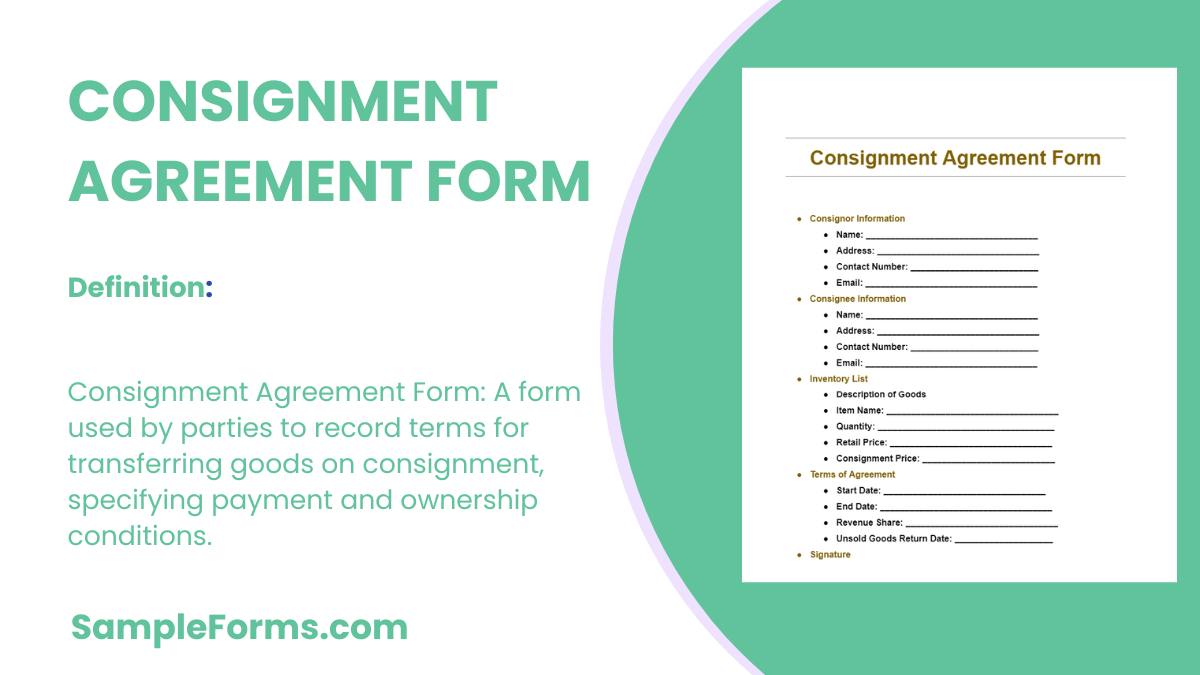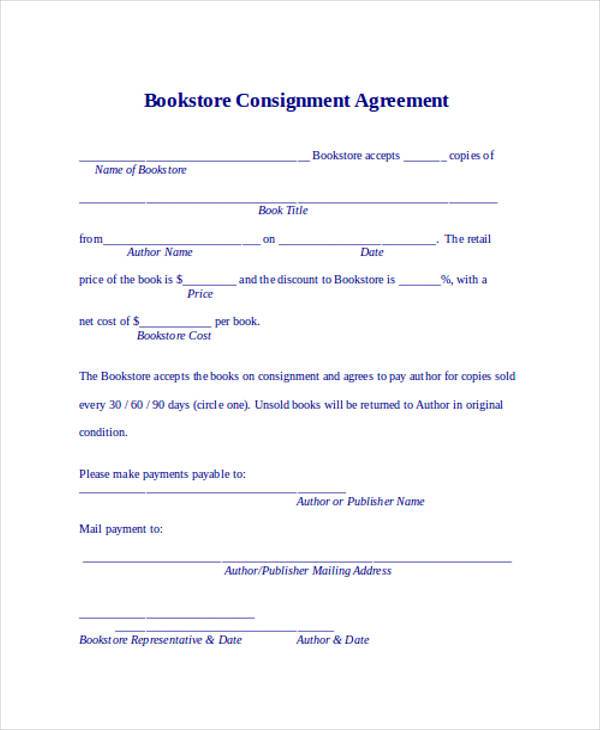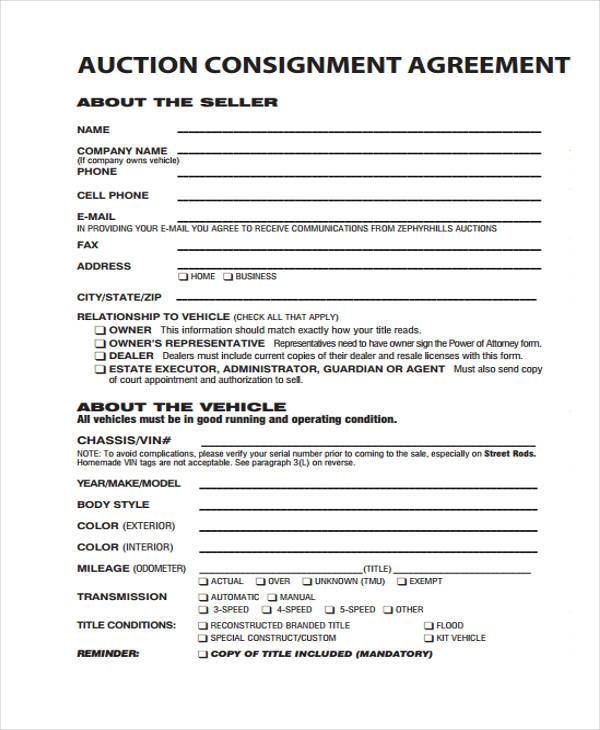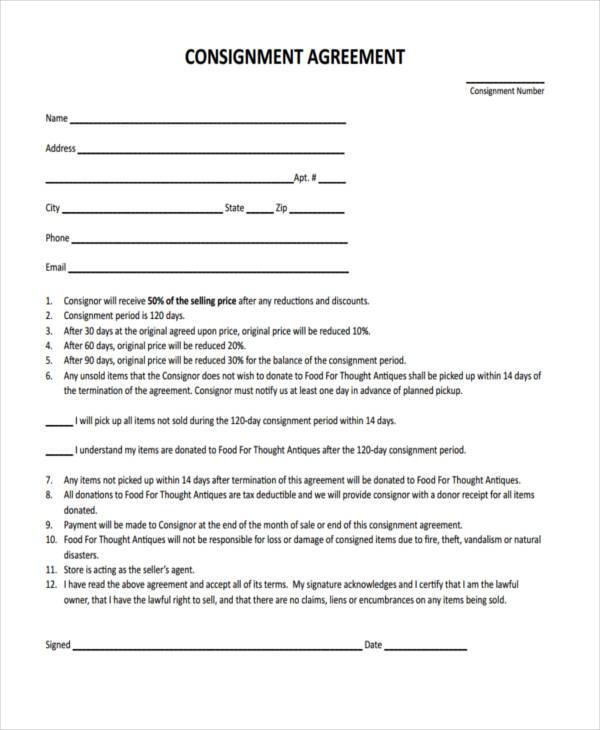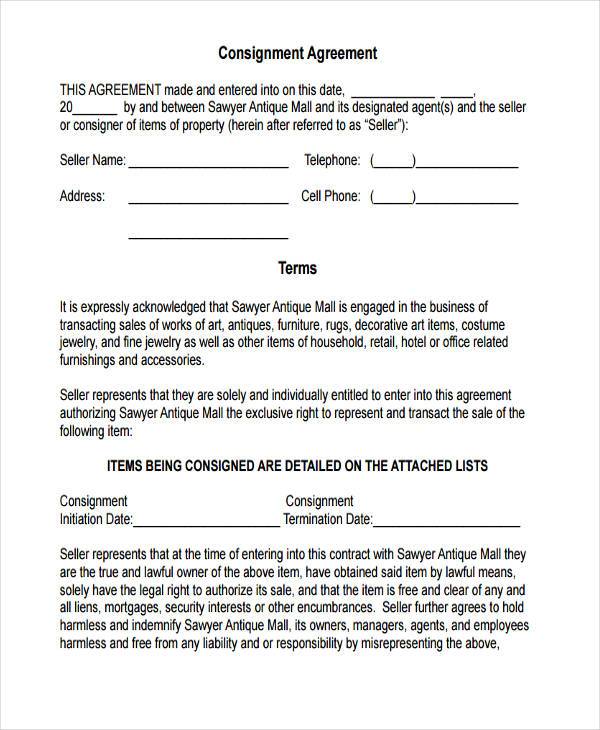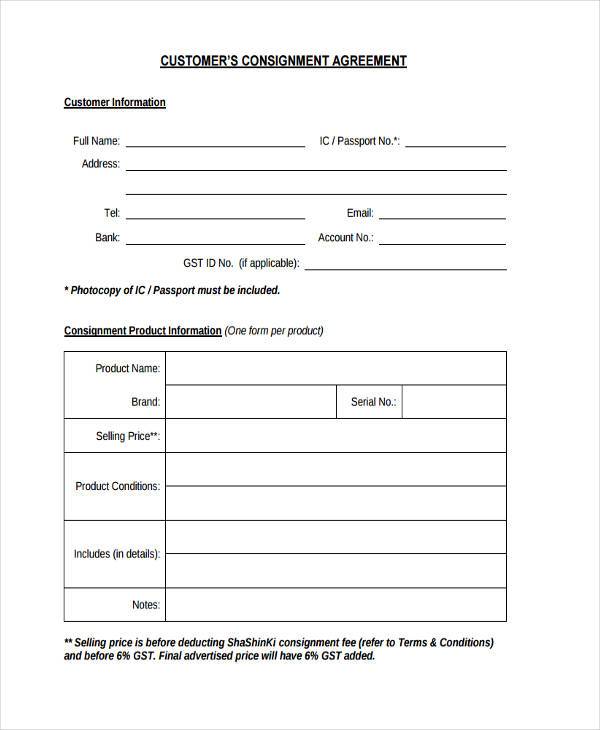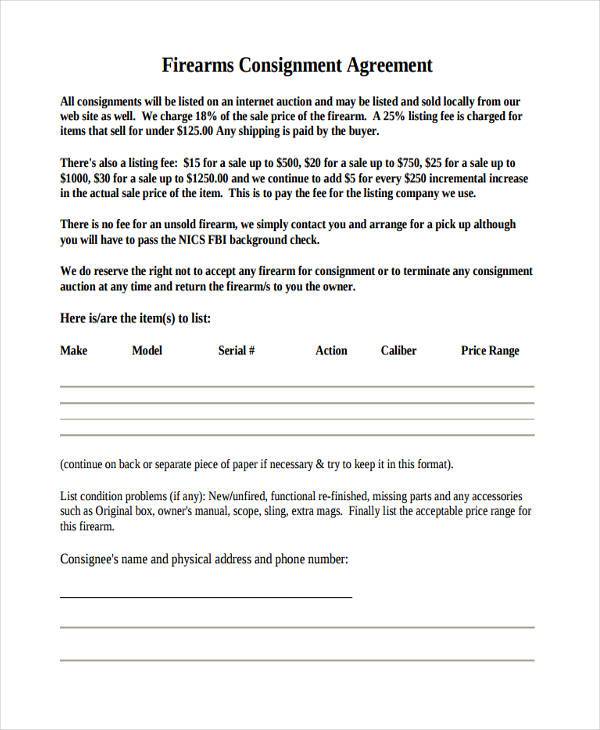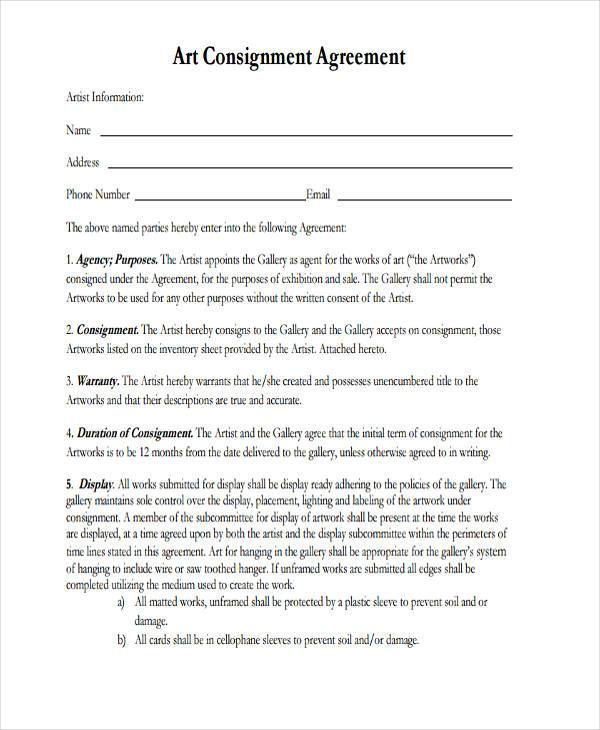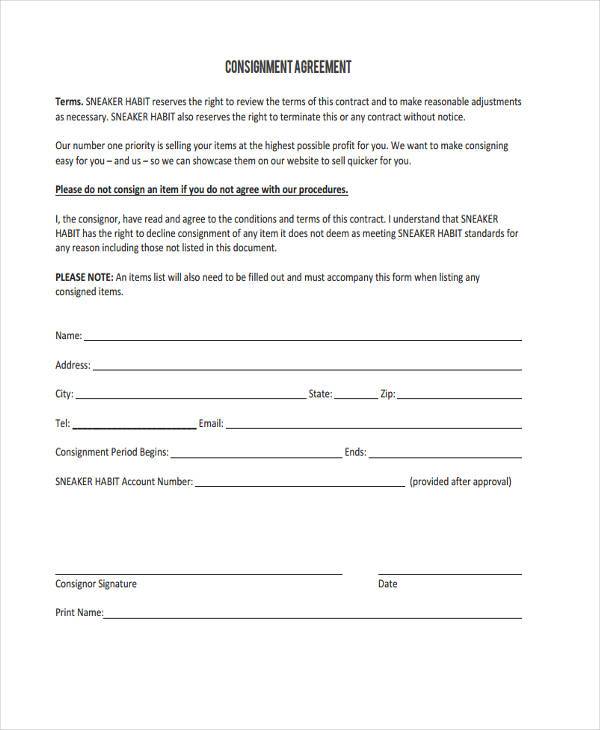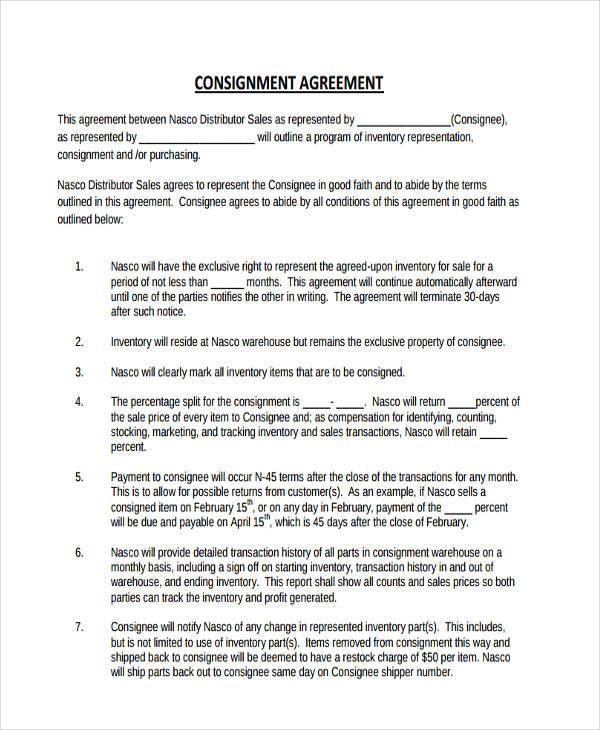Navigating the realm of consignment can be complex, and the Consignment Agreement Form is a vital tool for ensuring a smooth transaction. This detailed guide provides in-depth examples and expert insights into crafting effective consignment agreements. By focusing on key terms such as Consignment Agreement and Agreement Form, we highlight how these documents facilitate a secure partnership between consignor and consignee, ensuring clear terms of engagement, payment details, and responsibilities. Whether you are a seasoned business owner or a novice in consignment sales, understanding these forms will help you manage your consignment operations more efficiently and protect your interests.
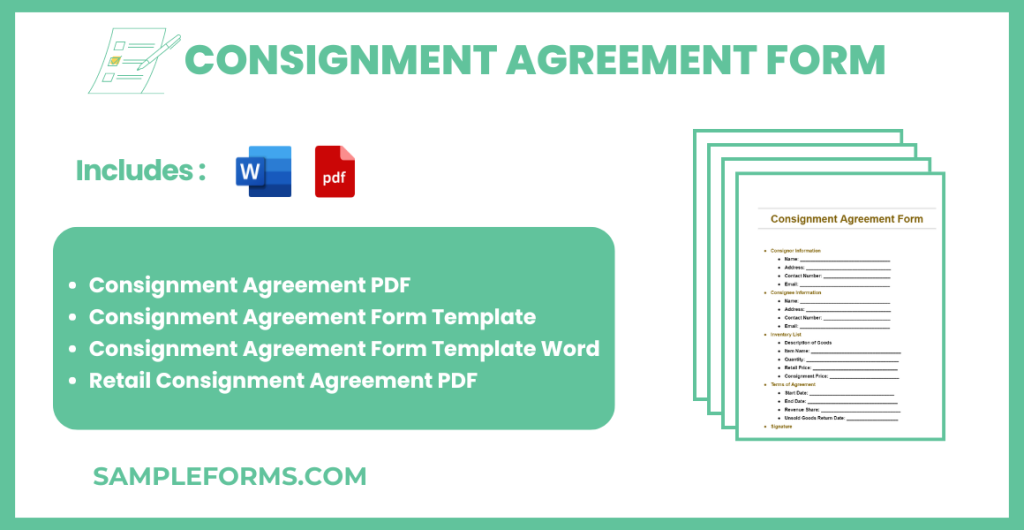
Download Consignment Agreement Form Bundle
What is Consignment Agreement Form?
A Consignment Agreement Form outlines the terms under which one party (the consignor) provides goods to another party (the consignee) for sale. The consignee agrees to sell the goods on behalf of the consignor without taking ownership, earning a commission upon sale. This agreement specifies the payment structure, responsibilities, and liabilities of both parties, ensuring a clear understanding of each party’s duties. It is crucial for legally binding the consignee to handle the merchandise with care and account for sales accurately.
Consignment Agreement Format
1. Introduction
- Parties: Identify the consignor and consignee with full names and addresses.
- Purpose: State the purpose of the consignment.
2. Consignment Terms
- Inventory List: Detail the items to be consigned.
- Pricing: Specify pricing or pricing mechanism.
3. Sales and Payments
- Revenue Split: Define the revenue share percentage.
- Payment Schedule: Outline when payments will be made.
4. Duration and Termination
- Effective Date: Specify the start date of the agreement.
- Termination Clause: Conditions under which the agreement can be terminated.
5. Signatures
- Consignor Signature:
- Consignee Signature:
- Date:
Consignment Agreement PDF
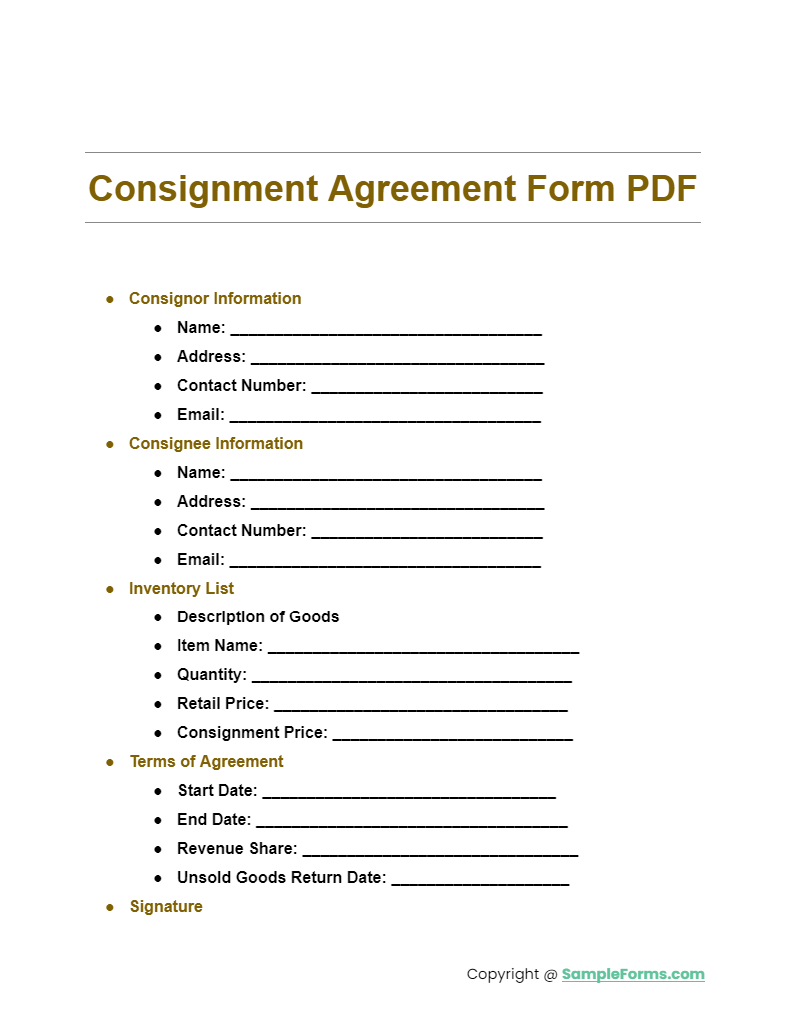
Download our detailed Consignment Agreement PDF tailored to ensure clarity in consignment operations, including elements similar to a Tenancy Agreement Form to outline duration and terms. You also browse our Lease Agreement Form
Consignment Agreement Form Template
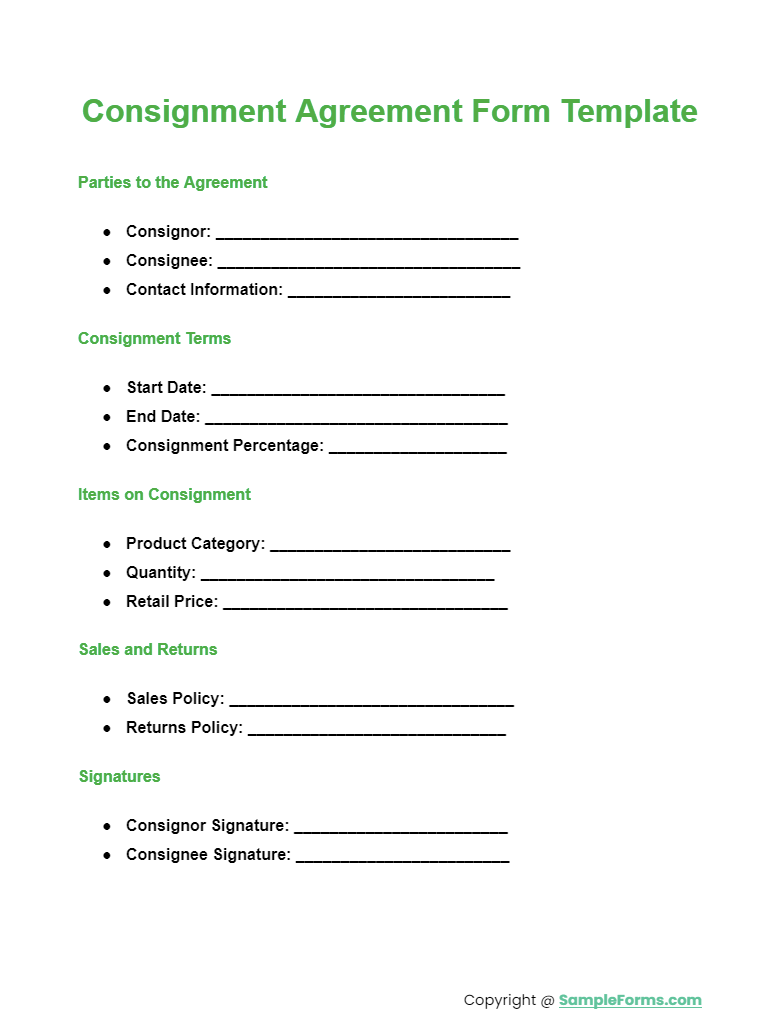
Utilize this versatile template to create tailored consignment agreements, incorporating structured components akin to a Business Agreement Form to specify roles and responsibilities clearly. You also browse our Hold Harmless Agreement Form
Consignment Agreement Form Template Word
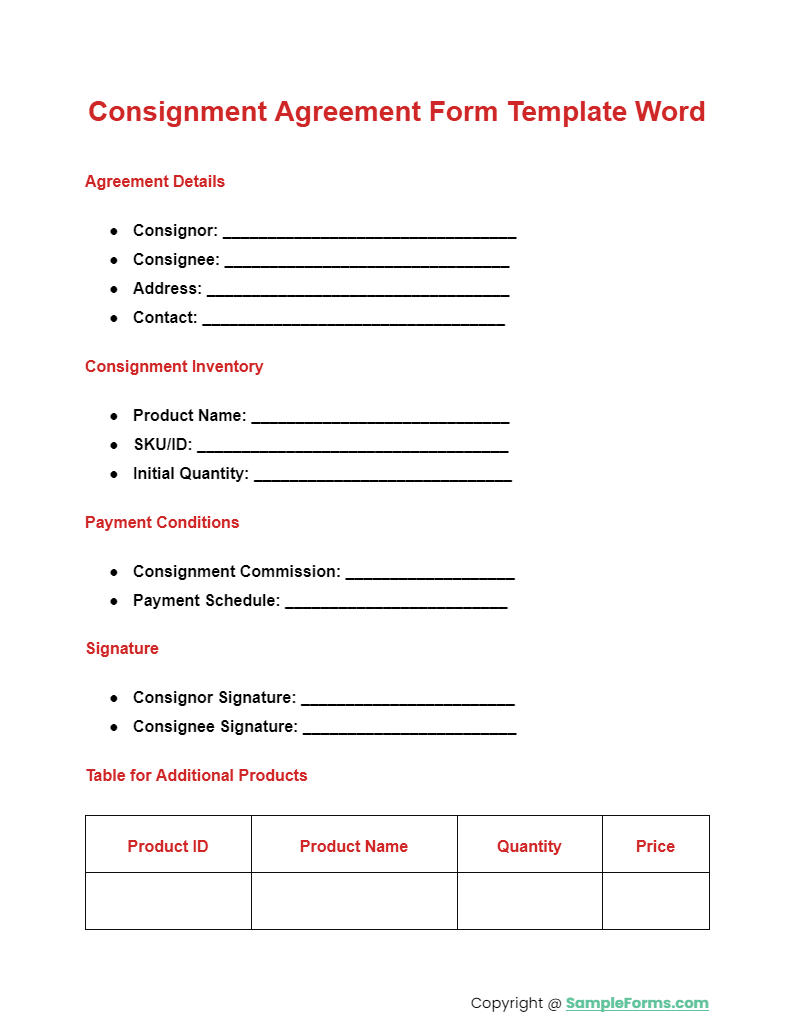
This Word template allows for easy customization of consignment terms, mirroring the adaptability of a Promissory Note Agreement Form to clearly define payment details. You also browse our Investment Agreement Form
Retail Consignment Agreement PDF
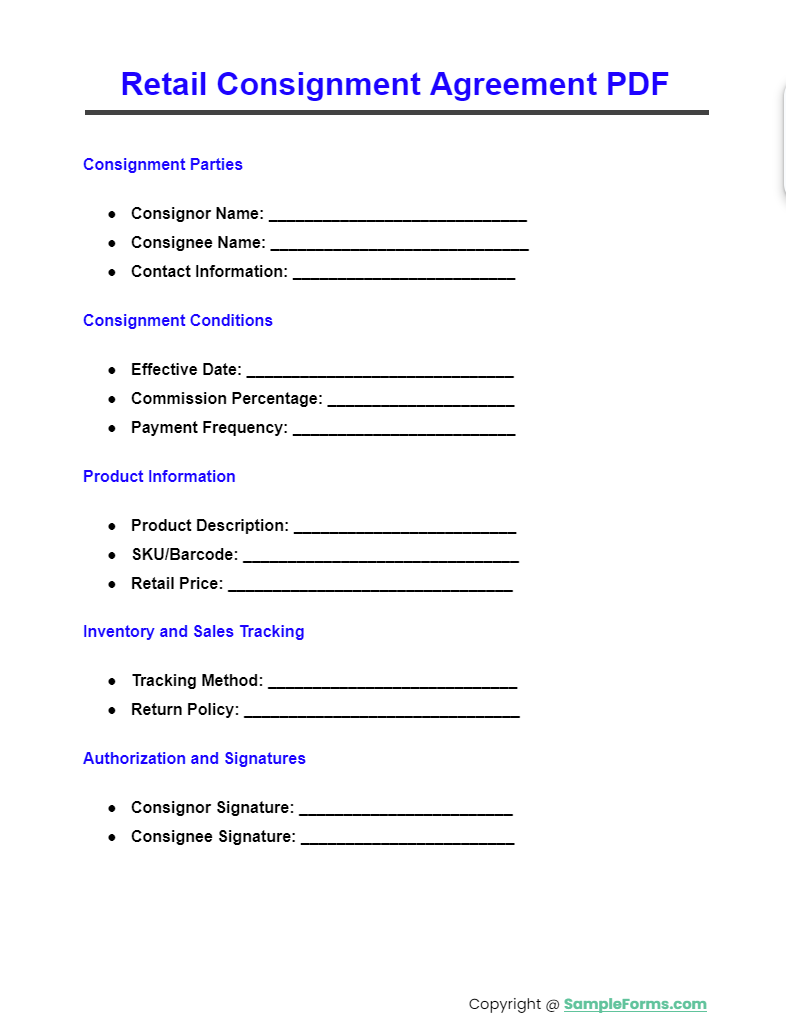
Designed specifically for retail settings, this PDF includes provisions similar to a Personal Loan Agreement Form, ensuring secure and clear financial arrangements between consignor and consignee. You also browse our Operating Agreement Form
More Consignment Agreement Form Samples
Artist Consignment Agreement Template
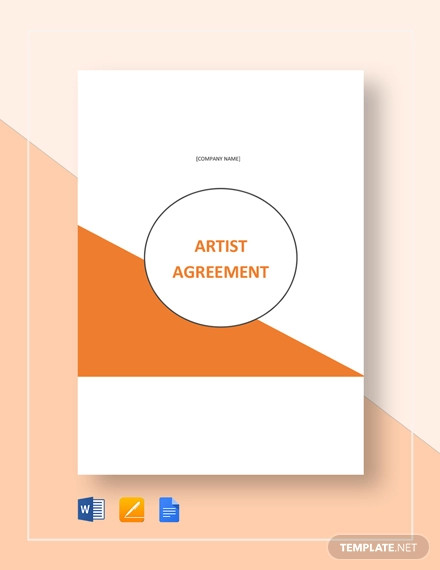
Bookstore Consignment Agreement Form
Antique Consignment Agreement Form Sample
Auction Consignment Agreement Form
Free Consignment Agreement Form
Fill Out Consignment Agreement Form
Vehicle Consignment Agreement Form Example
Customer Consignment Agreement Form Sample
Firearms Consignment Agreement Form
Art Consignment Agreement Form Example
Standard Consignment Agreement Form
Consignment Agreement Form in PDF
How Do You Write a Consignment Agreement?
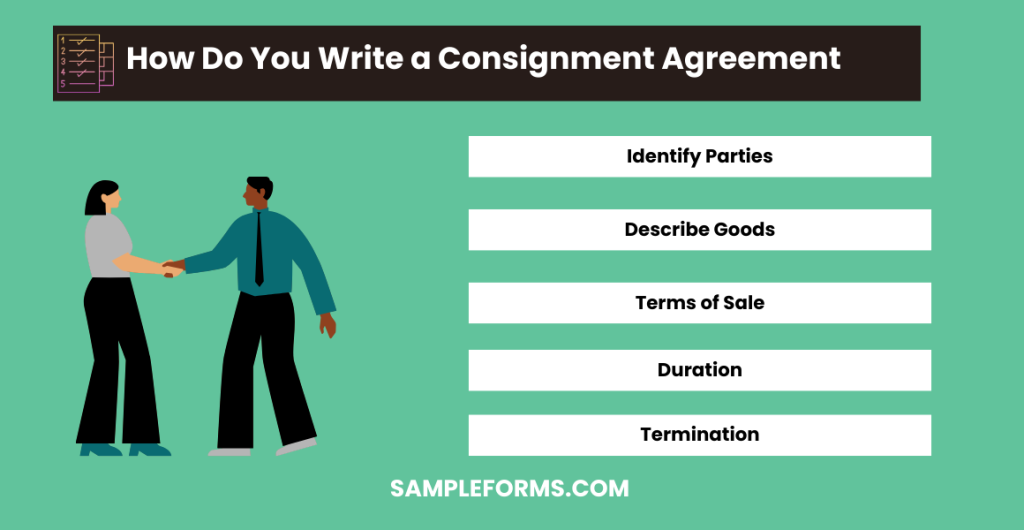
A consignment agreement outlines terms for selling goods on behalf of the owner.
- Identify Parties: Similar to an Apprenticeship Agreement Form, define all parties involved.
- Describe Goods: Clearly specify the goods being consigned.
- Terms of Sale: Outline pricing, fees, and sales conditions.
- Duration: Set the agreement’s active period.
- Termination: Conditions under which the agreement can be terminated. You also browse our Consignment Contract
What is the Process of Consignment?
Consignment involves placing goods with a third party to sell on your behalf.
- Delivery of Goods: Goods are delivered like in a Purchase Agreement Form.
- Inventory Listing: Create a detailed inventory list.
- Sales Effort: Consignee sells the goods.
- Reporting: Regular sales updates are provided.
- Payment: Proceeds are shared as agreed. You also browse our Parking Agreement Form
What Are Types of Consignment?
Consignment can vary based on agreement and goods type.
- Retail Consignment: Common in fashion and retail industries.
- Art Consignment: Used by galleries for artists’ works.
- Vehicle Consignment: For selling cars through dealers.
- Estate Consignment: For estate sales of personal property.
- Industrial Consignment: Involves machinery and industrial goods. You also browse our House Agreement Form
How Does Payment for Consignment Work?
Payment terms are crucial in a consignment agreement, ensuring fair compensation.
- Sales Percentage: Often a percentage of the sales price.
- Flat Fee: Fixed fee per item sold, akin to a Guarantor Agreement Form.
- Periodic Payments: Payments made at regular intervals.
- Threshold Payments: Payments after reaching certain sales figures.
- Final Settlement: Post-sale balance clearing. You also browse our Assignment Agreement Form
How Do You Handle Consignment Sales?
Effectively managing consignment sales is key to success.
- Sales Tracking: Implement systems to track sales.
- Marketing Support: Provide marketing like in a Sales Agreement Form.
- Quality Control: Ensure goods are in sellable condition.
- Customer Feedback: Gather and respond to customer feedback.
- Financial Reconciliation: Regularly reconcile sales and inventory. You also browse our Holding Deposit Agreement Form
What is the Disadvantage of Consignment Agreement?
Consignment agreements come with inherent risks and disadvantages.
- Delayed Payments: Payments are contingent on sales.
- Inventory Risk: Goods may be damaged or unsold. You also browse our Roommate Agreement Form
- Less Control: Consignor has less control over sales methods.
- Dependence on Third Party: Success relies on the consignee’s efforts.
- Contractual Disputes: Potential for disputes over terms similar to issues in a Prenuptial Agreement Form.
Why We Need a Consignment Agreement
Like all other General Agreement Forms, a Consignment Agreement is especially useful in providing tangible proof of evidence relating to the terms and conditions of the consignment. In a consignment arrangement, the consignee acts as the supplier for the consignor in order to provide goods to be sold to consumers. A Consignment Agreement helps to outline the fact that the goods remain to be the consignor’s legal property regardless of whether or not they are in the consignee’s possession. As soon as the merchandise is sold, the consumer then becomes the rightful owner of the product instead of the consignor. You also browse our Consulting Agreement Form
Another important reason for having a Consignment Agreement is for both the consignor and the consignee to maintain peaceful relations while conducting business together. A Consignment Agreement generally draws up the terms and conditions that both parties need to abide by, such as the division of sales. Some consignees demand for a sixty-forty division of proceeds, other at fifty-fifty. The division of sale percentage will typically depend on the negotiations between the consignor and the consignee. You also browse our Advertising Agreement Form
The Necessary Details in a Consignment Agreement
Issue a Time Frame
Providing a time frame in your Consignment Agreement will help benefit both the consignor and consignee. A time frame will allow the consignee to return the consigned items back to the consignor if they do not sell so as not to overburden the store with items that are stagnant, and so that the consignor can move the items to a different consignee who can market and sell the items quicker. You also browse our Volunteer Agreement Form
Set Up Terms for Unsold Merchandise
Most unsold merchandise are typically returned to the consignor while others are donated to charity. Be sure to properly outline the terms for any product that remains unsold after the specified time frame. You also browse our Management Agreement Form
What is the Purpose of a Consignment Agreement?
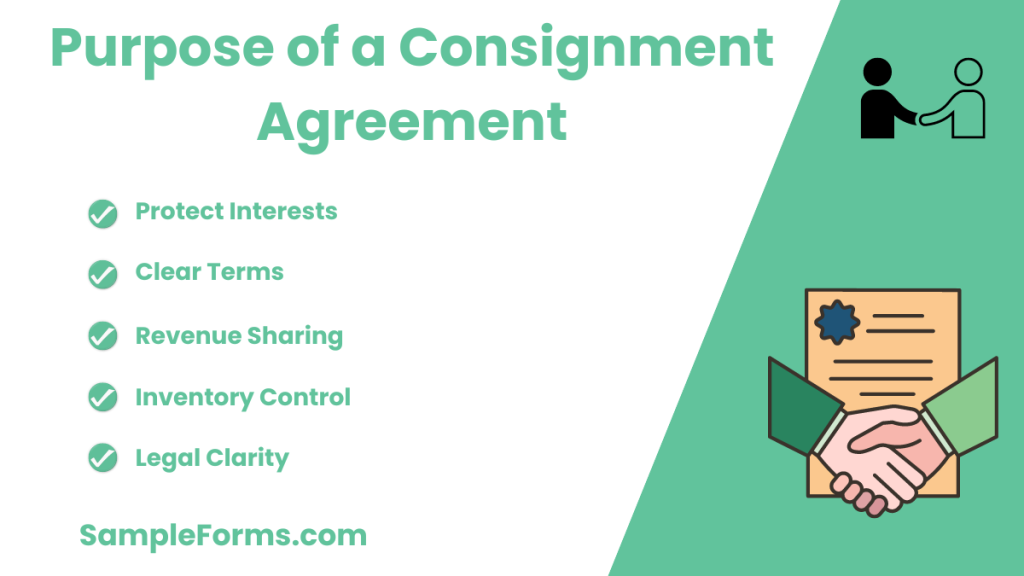
A consignment agreement secures terms and conditions for both consignor and consignee.
- Protect Interests: Ensures both parties’ interests are protected, similar to a Custody Agreement Form.
- Clear Terms: Defines responsibilities and liabilities.
- Revenue Sharing: Details profit distribution between consignor and consignee.
- Inventory Control: Manages consignment inventory.
- Legal Clarity: Provides legal clarity and recourse options. You also browse our Room Agreement Form
Is Consignment Worth It?
Consignment can be worthwhile, offering inventory flexibility and lower upfront costs, akin to a Vendor Agreement Form for managing business relationships. You also browse our Apartment Rental Agreement Form
Who Prepares a Consignment Note?
Typically, the consignor prepares the consignment note, detailing the goods sent, similar to a Service Level Agreement Form specifying service terms. You also browse our Lottery Agreement Form
What is a Consignment Document?
A consignment document formalizes the agreement between consignor and consignee to sell goods on consignment, similar to a Rental Agreement Form outlining rental terms. You also browse our Landlord Agreement Form
What Percentage Do Most Consignment Shops Take?
Most consignment shops take a 25-60% commission on sales, akin to a Training Agreement Form where services are exchanged for a fee. You also browse our Contractor Agreement Form
Who is the Consignee in a Consignment Agreement?
The consignee is the party responsible for selling the goods, holding a role similar to that in a Construction Agreement Form, overseeing project execution. You also browse our Land Agreement Form
What Are the Risks of Consignment?
Consignment risks include unsold inventory, dependency on the consignee’s performance, and potential loss or damage, similar to risks outlined in a Loan Agreement Form.
How Profitable is Consignment?
Consignment profitability can vary widely, influenced by factors like market demand, consignment rates, and operational efficiency, akin to evaluating profitability in a Land Purchase Agreement Form.
Explore our comprehensive resources for Consignment Agreement Forms, complete with samples, detailed form templates, and usage guidelines. These tools are essential for crafting effective agreements, similar to creating a Residential Agreement Form, to safeguard your transactions and consignment relationships.
Related Posts
-
FREE 5+ Commercial Sublease Agreement Forms in PDF | MS Word
-
FREE 50+ Mortgage Forms Download – How to Create Guide, Tips
-
FREE 4+ Real Estate Listing Information Forms in PDF | MS Word
-
FREE 7+ Garage (Parking) Rental Agreement Forms in PDF | MS Word
-
FREE 7+ Office Lease Agreement Forms in PDF | MS Word
-
FREE 4+ Salon Booth Rental Agreement Forms in PDF | MS Word
-
FREE 5+ Roommate Rental Agreement Forms in PDF | MS Word
-
Electrical Subcontractor Agreement Form
-
FREE 10+Non-Disclosure Forms in PDF | MS Word
-
FREE 5+ Construction Subcontractor Agreement Forms in PDF | MS Word
-
FREE 5+ Real Estate Lease Guarantee Co-Signer Agreement Forms in PDF | MS Word
-
FREE 5+ Lease with an Option to Purchase Agreement Forms in PDF | MS Word
-
FREE 7+ Realtors Lease Agreement Forms in PDF
-
FREE 10+ Subordination Agreement Forms in PDF | MS Word
-
FREE 10+ Condominium Lease Agreement Forms in PDF | MS Word
